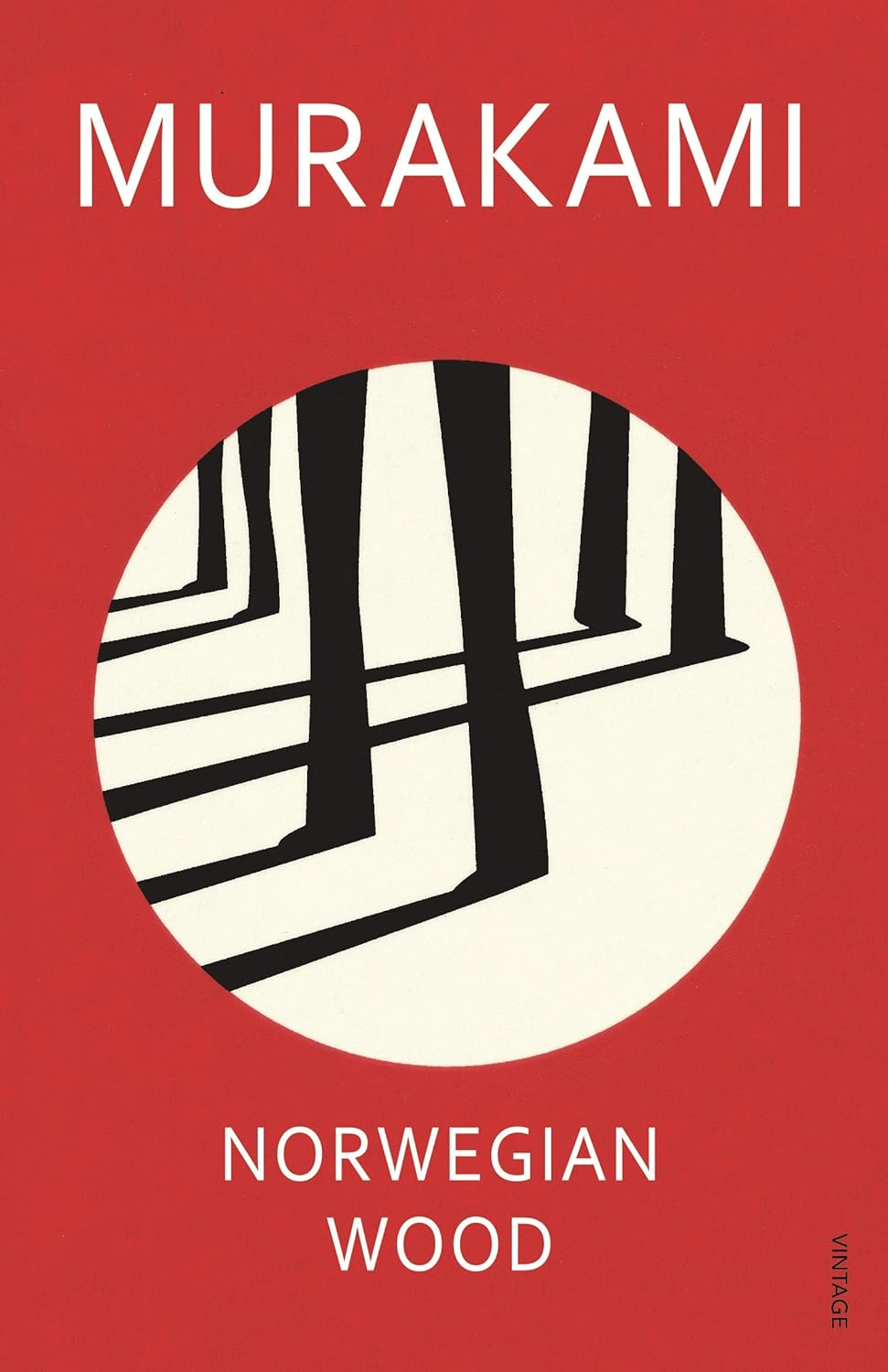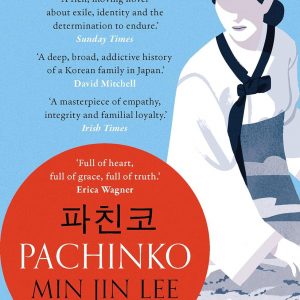Product description
Review
Everyone who reads
Norwegian Wood runs out to buy copies for friends and lovers… Drawing on Fitzgerald, Capote, Chandler and the Japanese tradition, his books are at once disarmingly direct and slyly, charmingly evasive. They are playful and melancholy; full of wrong turns and red herrings, corridors that lead nowhere and – above all – girls who disappear ― GuardianA masterly novel. . . .
Norwegian Wood bears the unmistakable marks of Murakami’s hand ― The New York Times Book ReviewThis book is undeniably hip, full of student uprisings, free love, booze and 1960s pop, it’s also genuinely emotionally engaging, and describes the highs of adolescence as well as the lows ―
Independent on SundayCatches the absorption and giddy rush of adolescent love… It is also, for all the tragic momentum and the apparently kamikaze consciousness of many of its characters, often funny and quirkily observed. Quietly compulsive and finally moving ―
Times Literary SupplementAbout the Author
Haruki Murakami is a world famous Japanese novelist. His many evocative and poignant works are focused around the themes of alienation, surrealism and nihilism and most are worldwide bestsellers. He has won The World Fantasy Award, The International Short Story Award, The Franz Kafka Prize and The Jerusalem prize, amongst several others. An important figure in postmodern literature, some of his classics include The Wind-Up Bird Chronicle, What I Talk about when I Talk about Running, Blind Willow, Sleeping Woman, Kafka on the Shore.





Sudhakar kadiyala –
While on a flight to Germany and while landing, the writer happens to listen to the song “Norwegian Wood” by Beatles.The wonderful song would have raised and must have elated the moods of all the other passengers on board listening to the pleasant, musical,soothing,lyrics ,but for the writer Murakami of “Norwegian Woods”,as being narrated that the song always reminded him of his shuddering past,an unforgettable memory and a saddened truth which can’t be erased from his memory.By the above we may conclude initially that it looked as if we are reading a sad story of someone whose thoughts are linked with the song.It also looked as if we are reading an autobiography of the one who has written the lines,until denied by the writer. himself. Murakami starts the book,”Norwegian Wood ” with an exceptional beginning by picking up a popular Beatles song, titled,”Norwegian Wood”,while putting life into the characters of the book simultaneously, filling with feelings and emotions, bringing out wonderful description of nature around,meadows,past memorable memories and the city of Tokyo, during the period 1968-70.The vivid description of dorms,universities,porn and students unrest etc are also brought out with such an impact that as a reader ,we have a feeling of witnessing the same in the present.As we continue reading, we learn that the lines above are thoughts of the protagonist, in the book’Thoru Watanabe’ and the song “Norwegian Wood” by Beatles,was the favorite song of his beloved ‘Naoko’.But then,to say the book as an ideal love story is also wrong,because on the one hand you read about the intense love,passion,emotions & feelings between Thoru Watanabe and Naoko(who is his best friend, Kizuki’ s girl friend), but on the other hand we also witness the same intense relationship between him and,his other girlfriend, Midori and which is no less as close.Besides,we also come across about the physical relationship between Reiko and Watanabe(after the death of Naoko & who also happens to be a roommate & close friend of Naoko at the rehab sanctuary). We also read, the multiple flings of Watanabe with other girls, along with his friend Nagaswa while at dormitory and during their college days etc makes the feeling strong that the book is not an ideal love story though it’s hard to keep the feeling aside at many a places, which is an incredible art by the writer to keep the intrest of the readers.With the number of deaths in the story by suicides (Kizuki,Hatsumi,Naoka),the frequent failure of love between(Toru Watanabe with Naoka and Midori, & Nagasawa with Hatsumi) ,an happily married life ending into divorce due to an unfortunate rumor (Reiko’s ending up in a rehab) makes the story sad and tragic.With out doubt these things on the part of the reader – I.e. the subtle feeling of autobiographical part,the love story part, and the sad & tragic part intrigues us.Thetakeaways from the book are the strong and unflinching friendships that exist between different characters.,the mention of Beatles songs and books like Great Gatsby,which are skillfully clubbed with the story.Though it’s not a suggestion to listen to the song of Beatles or read the book ,but definitely most of the readers may endup doing so if not done earlier,just out of curiosity. The charecter of Toru Watanabe for eg, as a caregiver to Midori’s father while giving her a break touches us near to the heart.Then complimenting Midori for her cuteness with words like “So cute that the Mountains crumble and the Oceans dry up,”etc brings out the wit in him ,the replies that comes from Thoru Watanabe,and also being a favorite and being liked by every other charecter in the bookgoes down long with the reader.Similarly, the mention of Storm Trooper and his habits of being a perfectionist bring a lot of laughter.Above all,both the writing by Murakami and the translation by Jay Rubin are outstanding..
Sanika Kelkar –
I’m uncertain about my feelings regarding Norwegian Wood by Murakami. I thoroughly appreciated the simplicity of his writing, which grapples with the most complex emotions. Coming of age and grief can be incredibly intricate and bewildering, and that’s exactly how I felt after finishing the last chapter of the book.Most of the time, the characters are easy to understand, but there were moments when I was puzzled about their actions or emotions. Although I enjoyed reading it, I’m still unsure about my overall impression and whether I truly liked it.Norwegian Wood left me feeling confused, yet it provoked deep reflection on themes of grief, love, acceptance, and, most importantly, the notion that life inevitably moves forward.
Charan –
The book came in perfect condition with a timely delivery.My rating for the book is ★★☆☆☆I picked this book since it was a long pending read of Murakami’s work. I loved Kafka on the Shore and his book about running. So experiencing such a kind of lovely magical realism fiction and amazing non-fiction, this book fell short of my expectations by leaps and bounds.After completing the book, I didn’t feel the impact. Of course, I can appreciate the sufferings of characters like Watanabe, Naoko, and Reiko but this book isn’t any magic or out-of-the-world story that I would ask someone “Hey have you read ‘Norwegian Wood’?”.The entire story of this book is about Watanabe’s love life and it is not interesting to me. As a whole, I felt that he was having lots of sex and liquor, he was studying the bare minimum and suffering for things out of his control. Watanabe, Naoko, and Reiko all lose someone they love a lot. The three of them suffer and the three of them have sex at different points of life. The sex at the end between Watanabe and Reiko seems to be plastic because, if he wants to have it, he could’ve very well had it with Midori. But he refused with her stating his love for Naoko. And all of a sudden in a skip of a heartbeat nothing stops him from having it with Reiko. I can’t see this as a sign of pursuing happiness at all.Said that, I liked the way, Watanbe’s personal life narrations intertwined with the backdrop of Japan’s civil unrest. Also, the students’ revolution ending inexplicably which enrages Watanabe, helps you visualize the late 60s of Japan while reading. Watanabe’s Western influence in his taste for art and music shows that Murakami beautifully makes the ‘East-meets-West’ very relatable.Apart from that, the writing was so good to make you visualize the Spring, Autumn, and Winter of Japan which you would want to experience. Above all, the food that becomes an integral part of storytelling is simply admirable. That’s something international.Excellent translation by Jay Rubin, who brought this story very close to me.Still, not recommending it.
Inayah parkar –
Amazing buy.. good seller..
Amazon Customer –
Good fiction if you like it
sivaganeshan b. –
complicated life situations , people’s story with no common advice or anything about morality , i felt like its a story that happened and while reading felt like watching well made movie
SATYABRATA PANDA –
It was a nice experience to read this book but only some pages are soiled
Aritra hazra –
The book is awesome but I wish the could also good but sadly it isn’t.The book came with a folded cover page and some of the pages are a little torn too.I was very sad seeing it.But the book is good.I request Amazon to be a little more careful/cautious when it comes to delivering books or any fragile product.Thank you…..
Sinjini b. –
The only reason that I didn’t go for five complete stars for this book is that, I still don’t know how I’m supposed to feel about it. There’s obviously this lingering feeling of satisfaction of having read it, but to be honest I don’t know whether I’ve enjoyed reading it or is it the other way round. I remember times, when I found it extremely difficult to relate with the characters of the book, and at others I could almost imagine myself being in their shoes. Although being from the same age group as that of the characters mentioned in the book, at times their emotions and their actions seemed foreign to me. The author is exceptionally unorthodox for having set up a backdrop and characters of the rebellious kind, in the era of the sixties. It certainly does give a vivid picture of Tokyo in the sixties. Naoko who was romantically involved with Toru, felt relatable at times. There were times, when the complications of Naoko’s Thoughts were so beautifully penned by the author, that I almost felt her pain. But, at the same time there were moments when Naoko seemed as distant to me, as did Toru. I would say the most flabbergasting character of the book is Midori. That character pulls off things which at times May become unfathomable to the human mind-and honestly, I tried hard to imagine that what Murakami must’ve had in mind while building up this character of Midori, but I failed miserably. She’s a rebel for certain, having born to middle class parents who wanted her to fulfill their unfulfilled aspirations ( we feel her right!! Our story is the same), and hence she has grievances against this society and her parents too which she expresses by getting things done perfectly, without leaving any scope for complaining. But there are times when her behaviour mat seem disturbing to the reader, but we cant really complain, because she seems to be the only character in the book, who is not terminally depressed inspite of having an ailing father to look after and her mother’s death to deal with. The protagonist may seem lust- driven to a few (for me he certainly was), or to be fair to the author, maybe had I been through what he had been through, i would’ve liked to fill that void using physical relationships without any commitments — or , would I ?! As I already wrote, it is confusing to determine. But what the book deftly does, is it blurs the lines between right and wrong and makes everything situational. It has a lot of philosophy in it, or atleast I felt so after reading it, it did certainly make an impact on me and I ended up thinking about it and the characters for days after k had finished reading it, but I realised that after a point in the story, there was a certain feeling of urgency within me to complete the book ASAP , and I don’t really know why that happened!!I would like to conclude by saying that, its definitely worth a read once, but I don’t whether you would want to read it for a second time. Murakami has a beautiful yet simple way of narration, and when I finished reading I was filled with a sweet sadness, something similar to what we feel while bidding goodbye to an old friend.
vikram tupe –
Very fast delivery, one of the best books I have read till date. Must read for everybody out there. Must buy. Nice story.